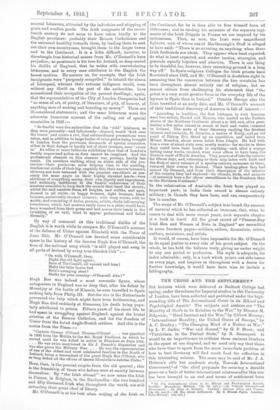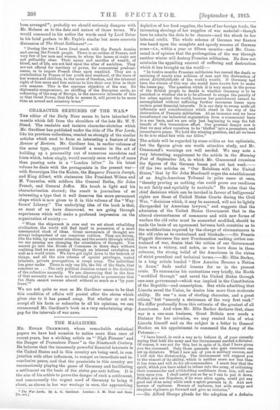THE CRISIS AND THE SETTLEMENT.*
Sra lectures which were delivered at Bedford College last spring, under the scheme for Imperial studies in the University of London, have been collected and published under the high- sounding title of The International Crisis in its Ethical and Psychological Aspects' The subjects and authors are "The Morality of Strife in its Relation to the War," by Eleanor M. Sidgwick; " Herd Instinct and the War," by Gilbert Murray; "International Morality ; the United States of Europe," by A. C. Bradley; " The Changing Mind of a Nation at War," by L. P. Jacks ; "War and Hatred," by G. F. Stout; and "Patriotism in the Perfect State," by B. Bosanquet. It would be an impertinence to criticize these eminent thinkers in the space at our disposal, and we need only say that those who have time to spare from the more immediate problem of how to beat Germany will find much food for reflection in this interesting volume. The same may be said of Mr. J. A. Hobson's able but academic study, Towards International Government,2 of "the chief proposals for securing a durable peace on a basis of better international relations after this war has been brought to an end, and terms of settlement have Ths faternatiunaZ Crisis in its Ethical and Pcichological Aspects. London: Humphrey MIllovd. [as. rd. net,3—(21 Towards intomationor Government. 13y John A. Hobson. London: Gem-go Allen and Unwin. [2s. ed. net.1-0) The Croat bantams:4. By .0. tirueat London; juhu Murray. Les. not.] been arranged"; probably we should seriously disagree with Mr. Hobson as to the date and nature of those terms. We would commend to his notice the words used by Lord Esher in his brief preface to Mr. Fayle's similar but more concrete discussion of The Great Settlement* :-•••• " During the war I have lived much with the French Armies and among the French people. There is no soldier of France, and very few of her mon and women, to whom the issues at stake are not pellucidly clear. Their agony and sacrifice of wealth, of blood, and of life, are not laid upon the altar of ambition. They are not offered for territory or power, for commercial predomi- nance, or to impose French ideas upon mankind. They are a contribution by France of her youth and manhood, of the tears of her women and children, to the cause of freedom, and the inherent right of free races and free nations to live their own lives in their own manner. This is the supreme objective of the war. No diplomatic compromises, no shuffling of the European cards, no redrawing of the map of Europe, in the narrower interests of this or that Great Power, that fails to secure it, will prove to be more than an armed and minatory truce."



































 Previous page
Previous page